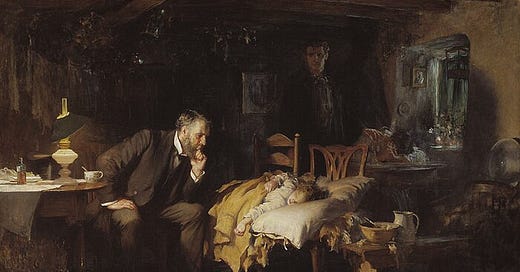Cancer patients need a doctor in charge of their care whom they can trust and who cares for them. But what do trust and care mean?
A trustworthy caregiver or clinician is competent and working for my well-being. Competent means that she has the knowledge and skills to deliver the medical standard of care.
Caring means that she has a personal and emotional commitment to my well-being. If we say about a doctor, “She really cares for me,” we point to this.
What does a “personal and emotional commitment” add to the commitment we expect from a trustworthy but impersonal and unemotional doctor? If I hire a financial advisor, I expect him to help me manage my money consistently with my financial goals. But if he has done his work competently, I wouldn’t expect more caring than I would from a stranger.
However, I want my doctor’s commitment to my well-being to be heartfelt. Why? In part, it is because of the intimacy of a doctor-patient relationship: I share information with her that I would be reluctant to share with anyone else. But the primary reason is that because my life is at stake, I want her to be personally and emotionally committed to my care.
The philosopher Bernard Williams considered a hypothetical case of a man on a sinking ship. He has the means to save one other person, either his wife or a stranger. If he must consider who to save, the husband has had “one thought too many,” and his marriage is defective. A husband should not be impartial when he thinks about his wife’s and a stranger’s safety. Spouses should be caring and committed in this sense. I do not expect my doctor to care about me as much as my wife and children do, but I want to be more than a client.
There is another reason to want a doctor who cares for me. The doctor doesn’t work for me; a system employs her. The players in the system are the teams of doctors and nurses, the insurance provider, and the insurer’s owners. The system will shape the doctor’s motivations and behaviour to some degree.
In a for-profit scheme, the insurer serves its shareholders. In a public, single-payer healthcare system, the insurer serves the taxpayers. Both systems can have incentives to withhold care. However, private systems can have incentives to provide care when they can, in effect, sell it with a substantial markup. Withholding care is not always a bad thing: there is evidence that many American patients have been harmed by overtreatment.
Be that as it may, I want a clinician who cares sufficiently deeply about me to fight the system when she believes it is in my best interest. I am convinced that I am alive today because I had a doctor who fought to get me access to immunotherapy.
Here is something else about trust and caring. A trustworthy and caring relationship goes both ways. Strive to be a competent patient who cares about your caregivers’ well-being. Do this for three reasons. First, it is the right way to live. Second, it is also the best way to elicit care from a good caregiver. Finally, it helps sustain a caregiving community and thereby benefits other patients.
What is a trustworthy patient? Try to report your symptoms accurately. If you are asked to keep records, do it. If the recording task is too burdensome for you, explain that. When a doctor tells you how to care for yourself at home, do your best to adhere to those instructions. If you are asked about your adherence to those instructions, be as honest as you can. Most patients do not self-report accurately; they report their intention to be a good patient or how they performed on their best day.
What should a caring patient do? This is easy to say: be courteous and grateful. However, these small virtues are hard to practice when you are in substantial pain and must wait for care. These problems are system problems; your doctor doesn’t cause them. If you spend a lot of time in clinics, you will notice that some patients are entitled and rude. Courtesy and gratitude on your part will help your doctor care for you and others.
Good news: my atrial fibrillation has substantially decreased in the past week, possibly because we have been tapering down the steroids I have been taking.









Bill, thanks again for sharing your perspective. I am thankful that most of the medical doctors throughout my life (in several states in the USA, UK and Canada) have been competent and caring, which includes a gentle touch, explantations and time. Five years ago my doctors had to type in all the notes so it often felt as though they weren't looking at me. Now a scribe or a nurse is in the room so the doctor can give her/ his ful attention, which I greatly appreciate.
It's good your atrial fibrillation is under better control!
Don't we all want trustworthy and caring clinicians? But the devil's in the details. There seems to be a push to redefine trustworthiness to mean an expectation that the clinician will carry out the patient's will (without any regard to health, per se). When some talk about a trustworthy clinician, they mean someone who can reliably use their technical expertise to do what I want them to do. Insofar as they contradict me, they're not trustworthy. Perhaps they shouldn't even be a clinician.
I worry this is fallout from applying machine-like standards to human care.